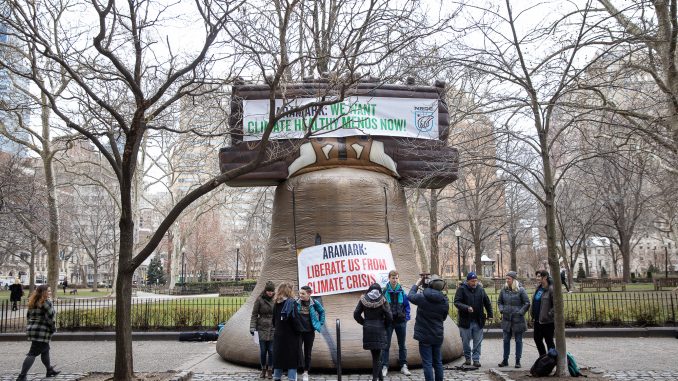
A student organization is working with an environmental advocacy group to demand that Temple University’s on-campus food services provider commit toward reducing its carbon footprint.
TU Ecological Eating Club and the Natural Resources Defense Council, along with students from Drexel University, Boston University, the University of North Carolina at Chapel Hill and University of Florida, are mounting a national campaign to pressure Aramark to pledge to lower its carbon emissions by 20 percent by reducing the amount of red meat, dairy and eggs on their menus.
“We believe passionately about reducing our carbon footprint by cutting out animal products in the way that the NRDC is going about that with Aramark,” said Jessica Harrington, founder and president of Temple’s club.
A United Nations report released in August 2019 found that reducing meat consumption worldwide could help curb the effects of climate change. An individual replacing steak with beans once a week for a year would keep the equivalent of 331 kilograms of carbon dioxide out of the atmosphere, the Washington Post reported.
Aramark agrees reducing carbon emissions is important and released a comprehensive plan to be more sustainable in December 2019, wrote Karen Cutler, an Aramark spokesperson in an email to The Temple News.
As part of its efforts, the company has created more than 200 new plant-based recipes, increased the amount of fruit, vegetables and whole grains by nearly 20 percent across its menus, and reported a 5 percent average reduction in the amount of red meat in its recipes, Cutler wrote.
Aramark is also working on improving fuel efficiency, reducing food waste and buying less plastic straws and stirrers to improve sustainability in the coming years.
“We believe that the work we are doing as part of our sustainability journey is in sync with the goals of NRDC and are disappointed that NRDC has not acknowledged our substantial progress,” Cutler wrote.
But without a commitment to reduce emissions by a specific amount, Aramark’s efforts do not go far enough, said Shanzeh Haque, an NRDC campus organizer.
“To us, it’s crazy that Aramark hasn’t even committed itself to sustainability,” Haque said. “Like, they haven’t even shown that they’re concerned, that they care about it.”
Students from Temple and Drexel University protested at Aramark’s annual shareholder meeting in Philadelphia on Jan. 29. NRDC chose to start its campaign at the two universities since Aramark, headquartered on Market Street near 23rd, is based in Philadelphia, Haque said.
Temple entered into its current 15-year contract with Aramark in 2017 after switching from Sodexo, The Temple News reported.
The NRDC is planning events on Temple’s campus in the coming months to pressure Aramark to make a commitment to reducing emissions, Haque added. The organization will be expanding its campaign to other universities in the coming weeks, said Sujatha Bergen, the NRDC’s health campaigns director.



Be the first to comment